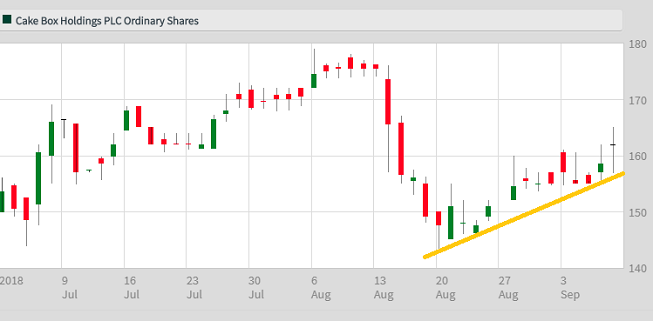Stockwatch: An AIM share to gobble up
11th September 2018 11:53
by Edmond Jackson from interactive investor
Return of The Great British Bake Off is a perfect topping for this retail roll-out firm, reckons companies analyst Edmond Jackson.

Is it sensible occasionally to think in terms of a 'cynical buy'? I'm referring to a stock able to gain popular attention, where the business may do well in the medium term but if you were picky then you might pass it by.
Examples might be speculative technology stocks in a bull market or tobacco and alcohol products that are bad for health but retain firm demand. What the heck: if punters are scrambling for it, why not buy with your eyes open to the risks.
Cake Box, a franchise-driven operation selling gooey cream cakes, is a latest example. It listed at 108p on AIM last June despite ongoing headlines about how obesity is now a British epidemic. However, with renewed fascination at The Great British Bake Off, will people ever limit indulgence in cake?
This company also dials into the growing "free from" theme: founded by Indian-origin cousins in East London in 2008, to exploit a lack of egg-free commercial cake e.g. for Hindus, then extending into celebration cream cakes with personalised messages even decorative photos.
Sponge is made in Enfield and distributed to a fast-growing network of near-100 franchised stores which add the fresh cream and decorations. It's currently a franchising hit amid strong consumer demand and the relatively simple nature of the operation after appropriate training.

Source: interactive investor Past performance is not a guide to future performance
Riding on the most overweight country in Europe
Obesity is declared the number one health risk, with diabetes spreading fast - last November, the OECD declared 26.9% of the population above the official definition of obesity.
Three months ago, the NHS declared a third of primary school children caught up in an "obesity epidemic". Maybe that helps explain why Cake Box's revenue (see table) has more than doubled in its last two financial years and its listing particulars also cite compound annual growth rate of 55% from March 2013 to March 2018, operational gearing shown by operating profit up 63% over same period.
Principled investors might wait for a vegan food operation or fresh juice bar chain to float, but how long will that take - and compare financially?
Meanwhile, at the posh end of gooey cake retail, Patisserie Valerie has grown from small outlets in Soho to a nationwide chain that's nowadays a circa £450 million AIM-listed company - Patisserie Holdings - on price/earnings (PE) multiples in the mid-20's.
Both these companies represent the classic roll-out of a commercial, especially retail, concept as a means to shareholder value: e.g. since the 1990's a key protagonist has been Luke Johnson who cut his teeth this way floating and expanding the Pizza Express chain.
He's found serial businesses to apply roll-outs in plc's and private equity. Given he chairs Patisserie Holdings I wouldn't be surprised if Cake Holdings is already on his watch list, and if Patisserie's earnings growth moderates to single percentage figures as currently forecast, a combination of the two could be usefully synergistic and also a chance to extend Cake's offerings and improve Patisserie's reach.
| Cake Box Holdings: consolidated income statements | |||||
|---|---|---|---|---|---|
| year to 31 March | |||||
| 2018 | 2017 | 2016 | |||
| £ | £ | £ | |||
| Revenue | 12,833,659 | 8,664,036 | 5,592,012 | ||
| Cost of sales | -7,263,209 | -5,015,429 | -3,037,963 | ||
| Gross profit | 5,570,450 | 3,648,607 | 2,554,049 | ||
| Administrative expenses | -2,273,128 | -1,661,583 | -1,339,406 | ||
| Other operating income | 84,000 | 333 | 0 | ||
| Operating profit | 3,381,322 | 1,987,357 | 1,214,643 | ||
| Finance income | 1,114 | 22 | 713 | ||
| Finance costs | -46,786 | -63,267 | -45,902 | ||
| Profit before tax | 3,335,650 | 1,924,112 | 1,169,454 | ||
| Tax expense | -568,053 | 298,879 | 105,070 | ||
| Profit for the year | 2,767,597 | 1,625,233 | 1,064,384 |
Source: Admission Document Past performance is not a guide to future performance.
Mixed customer reviews online
There's quite polar opinion e.g. asserting either "Excellent" or "Terrible" with relatively fewer in between; although the same could be said of Marmite which has thrived since the late 19th century. While some rave, a consistent complaint is the sponge being dry and occasionally grainy, which presumably relates to the lack of egg, also colouring tends to stain fingers.
In this respect, page 6 of the listing particulars is carefully worded (my italics for emphasis): "the directors believe egg-free has no effect on taste or texture..." i.e. at the group's current size of say £16 million revenue in its current financial year, it probably doesn't hinder sales growth as there's enough determined "egg-free" buyers offsetting. But they are likely a small community and the cakes aren't "dairy-free", potentially a wider long-term trend.
So, the group's long-term success partly rests on whether the wider population accepts egg-free or taste tires of Cake's offering once you've tried a few. For now, it seems protests are counter-balanced by emotional craze for the latest in gooey tempting cream.
Cake's revenue model is quite simple: supply of ingredients to franchisees represents 80% of gross profit; the remainder from store fit-outs and equipment supply. There's also a 7.5% cut of online sales sent through to a store. Thus, hygiene will be an ongoing risk factor, dealing with perishable fresh cream in localised units, where franchisees/employees - despite receiving training - may have an entrepreneurial background than in food/catering.
Investors should be steeled for at least one blurt about upset stomachs on social media, then picked up in the press. Most likely it won't be existential but could blend with other issues affecting appetite for this kind of food.
Strong margins help leverage profits
Meanwhile, in the short to medium term, Cake's income statement points to upside as attractive margins meet keen demand from potential franchisees - whose run-rate of inquiries is currently around 75.
Over the 2016 to 2018 financial years, the gross margin slipped from 45.7% to 43.4%, while the operating margin rose from 21.7% to 26.3%, aided by £84,000 other operating income.
That's still fundamentally attractive, in context of about two stores opening monthly with a current target of 250 outlets in the UK. Established stores show 15% sales growth and an average operating profit of £94,000 for franchisees. Each franchisee needs to summon around £150,000 to open a store, some £108,000 of which can be debt where Cake has arrangements with banks to help provide debt albeit with no recourse to the group.
Its expansion is thus driven without need for external capital or entering leases. As of last March, the balance sheet had less than £0.2 million near-term debt and nearly £1.5 million long-term, in context of £4.7 million net assets – i.e. a truly "capital light" balance sheet.
The cash flow statement shows £3.2 million net cash generated from operations versus £0.3 million investment needs, thus modest debt should reduce as operational gearing kicks in with expansion, enabling good dividend growth also.
So, while Cake's marketing concept lasts, its financial one offers good risk/reward for shareholders.
Mind there's founder selling also
A cynical view is wary too about how founders have cashed in £16.5 million, reducing their stake from 88.4% of Cake's equity to 50.1% - thus diversifying risk while also retaining control.
They could be regarded as cashing in on enthusiasm for small caps at the peak of a bull market liable to wane, as the emerging markets' debt crisis and US interest rate hikes spark liquidity preference. Yet good marketing concepts can thrive at any stage of the business cycle.
Stated aims of the flotation were to raise the group's profile and offer staff equity incentives, if seemingly less important than franchisees' success at selling this type of gooey, often personalised cake.
At 163.5p, the stock is off its high of around 175p in August, having found support at about 147p mid last month. That represents a market cap of around £65 million, or about 3-4 times prospective sales and a PE multiple in the high teens.
I haven't seen forecasts, but would pencil in earnings per share of about 9p for the current year to March 2019. It's impossible to say if public appetites may change, yet my gut feel is: Speculative Buy.
Edmond Jackson is a freelance contributor and not a direct employee of interactive investor.
These articles are provided for information purposes only. Occasionally, an opinion about whether to buy or sell a specific investment may be provided by third parties. The content is not intended to be a personal recommendation to buy or sell any financial instrument or product, or to adopt any investment strategy as it is not provided based on an assessment of your investing knowledge and experience, your financial situation or your investment objectives. The value of your investments, and the income derived from them, may go down as well as up. You may not get back all the money that you invest. The investments referred to in this article may not be suitable for all investors, and if in doubt, an investor should seek advice from a qualified investment adviser.
Full performance can be found on the company or index summary page on the interactive investor website. Simply click on the company's or index name highlighted in the article.
Disclosure
We use a combination of fundamental and technical analysis in forming our view as to the valuation and prospects of an investment. Where relevant we have set out those particular matters we think are important in the above article, but further detail can be found here.
Please note that our article on this investment should not be considered to be a regular publication.
Details of all recommendations issued by ii during the previous 12-month period can be found here.
ii adheres to a strict code of conduct. Contributors may hold shares or have other interests in companies included in these portfolios, which could create a conflict of interests. Contributors intending to write about any financial instruments in which they have an interest are required to disclose such interest to ii and in the article itself. ii will at all times consider whether such interest impairs the objectivity of the recommendation.
In addition, individuals involved in the production of investment articles are subject to a personal account dealing restriction, which prevents them from placing a transaction in the specified instrument(s) for a period before and for five working days after such publication. This is to avoid personal interests conflicting with the interests of the recipients of those investment articles.